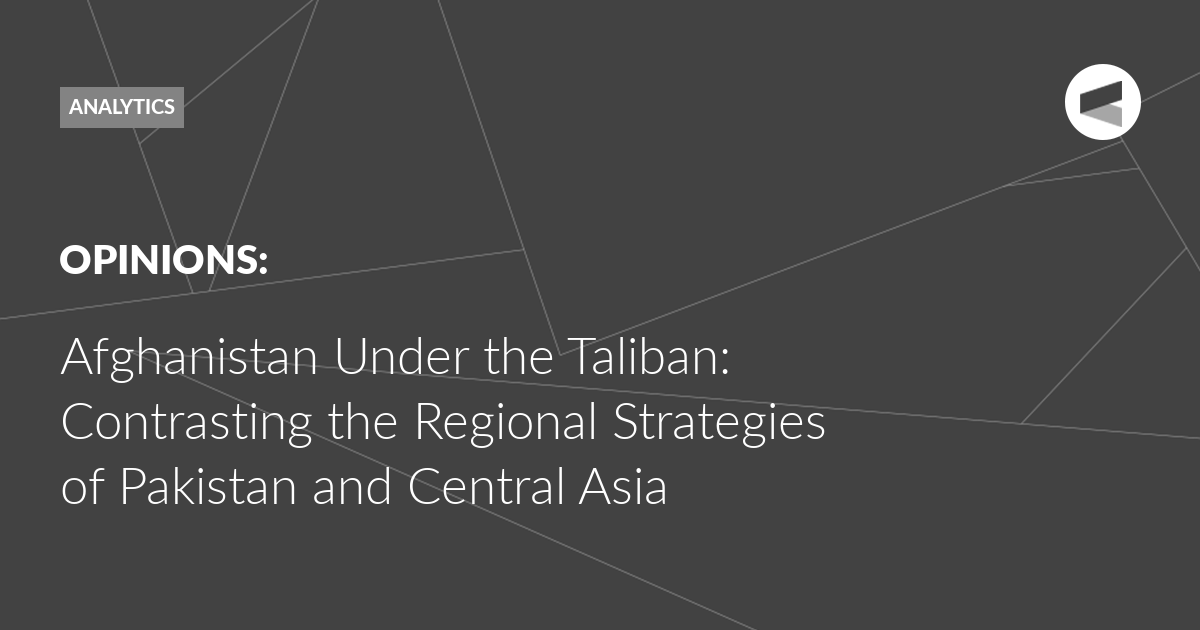The engagement of Central Asian states with the Taliban-led Afghan government has drawn significant regional and global interest. While the Central Asian republics view the Taliban as partners for economic connectivity, regional stability, and counterterrorism cooperation, Pakistan is approaching the situation from a perspective shaped by its historical ties, strategic priorities, and pressing security concerns. Pakistan, much like Central Asian states, has sought to enhance trade, regional connectivity, and security cooperation with Afghanistan. However, the realities on the ground and prevailing security threats have necessitated a more pragmatic and cautious approach to safeguard Pakistan’s national interests. This analysis examines why the Central Asian nations are engaging with Kabul pragmatically, while Pakistan has adopted a cautious but constructive approach shaped by historical context, security imperatives, and geopolitical realities.
Central Asian States’ Engagement with the Taliban
Economic and Infrastructure Interests
The Central Asian states perceive Afghanistan as a land bridge between their economies and South Asia, particularly Pakistan and India. Their primary motivation for engaging the Taliban is to promote trade and energy projects that can benefit the entire region—goals that align with Pakistan’s own aspirations for regional economic integration:
· Railway and Trade Routes: Uzbekistan is spearheading the Trans-Afghan railway linking the city of Termez, Uzbekistan to Pakistan’s seaports via Mazar-i-Sharif and Kabul, integrating Afghanistan into regional trade networks—an initiative that Pakistan has supported
as part of its regional connectivity vision.
· TAPI Pipeline: Turkmenistan is invested in the $10 billion Turkmenistan-Afghanistan-Pakistan-India (TAPI) gas pipeline, with the Taliban pledging 30,000 troops for its security. Pakistan remains an essential stakeholder in this project, recognising its importance for energy security.
· Electricity Transmission: The CASA-1000 project, led by Tajikistan and Kyrgyzstan, seeks to export surplus electricity to South Asia through Afghanistan, a move that complements Pakistan’s increasing energy demands.
· Kazakhstan’s Trade Policy: Kazakhstan, despite its cautious stance, has removed the Taliban from its list of banned organisations in order to facilitate trade and investment, a step that aligns with Pakistan’s broader efforts to maintain cross-border trade and economic stability.
While the Central Asian nations have actively pursued these initiatives, Pakistan has also attempted to foster similar cooperation. However, security concerns and regional instability have necessitated that Islamabad adopt a balanced approach which ensures that economic engagement does not come at the expense of its national security.
Security and Border Stability Considerations
While initially wary of the Taliban’s return, the Central Asian states have come to view engagement as a means of ensuring their own security. Their approach revolves around:
· Preventing Extremist Spill-over: Despite initial concerns about the Taliban harbouring international terrorist groups such as the Tehrik-i-Taliban Pakistan (TTP), Al Qaeda (AQ) and East-Turkestan Islamic Movement (ETIM), no major extremist spill-over into Central Asia has occurred. However, occasional border skirmishes between Taliban forces and Central Asian security personnel, particularly along the Tajik
and Turkmen
borders, indicate that tensions persist and underscore the fragility of the security situation. Pakistan, meanwhile, has faced a far more direct and sustained security challenge along its border, necessitating a more vigilant stance.
· Managing Borders and Refugee Flows: By maintaining diplomatic channels, Central Asian states ensure border security and prevent an uncontrolled influx of Afghan refugees. Pakistan, which is already hosting millions
of Afghan refugees, has taken similar steps but must also contend with cross-border security threats that pose additional challenges.
· Fighting Common Threats: Engaging the Taliban allows them to extract counterterrorism assurances, especially against Islamic State-Khorasan Province (ISKP), a common enemy. Pakistan, while engaging with Kabul, has had to take a more robust approach due to the presence of hostile elements such as the Tehrik-i-Taliban Pakistan (TTP) operating from Afghan territory.
Geopolitical and Diplomatic Factors
Central Asian states aim to shape Afghanistan’s future through diplomacy rather than confrontation. Pakistan, too, has maintained engagement with the Taliban but has emphasised security assurances alongside economic cooperation. Key considerations include:
· Regional Autonomy: Unlike in the 1990s, when they opposed
the Taliban, Central Asian states now prefer pragmatic engagement. Similarly, Pakistan has recalibrated its policy, advocating for regional peace while ensuring its strategic concerns are addressed.
· Conditional Engagement: No Central Asian state has formally recognised the Taliban regime, yet they maintain economic and diplomatic interactions—similar to Pakistan’s approach, which includes diplomatic engagement but stops short of official recognition.
· Influence of Russia and China: With both major powers
increasing engagement with the Taliban, the Central Asian governments see dialogue as a necessary regional strategy. Pakistan, a key ally of China
and an important regional actor, has also engaged
with Afghanistan under similar considerations.
Pakistan’s Perspective on the Afghan Taliban
Historical Context and Strategic Concerns
Pakistan’s engagement with Afghanistan has historically been driven by the need for regional stability and secure borders. While Pakistan maintained ties with the Taliban in the 1990s as part of its broader regional strategy, the evolving geopolitical landscape has led Islamabad to recalibrate its approach. The return of the Taliban in 2021 has necessitated that Pakistan engage constructively while prioritising its national security, economic interests, and regional stability. This shift reflects Pakistan’s pragmatic commitment to fostering cooperation while ensuring that its sovereignty and security concerns remain safeguarded.
· Durand Line Disputes: The Taliban have yet to formally recognise the Pakistan-Afghanistan border, leading to periodic tensions. Despite these challenges, Pakistan remains committed to advocating for stability, enhanced border management mechanisms, and the resolution of disputes through diplomatic channels. Pakistan has also invested in infrastructure
and border control measures to facilitate legal trade and movement while ensuring security along this critical frontier.
· India’s Diplomatic Presence: India has re-engaged in Afghanistan through diplomacy and development projects, raising strategic concerns for Pakistan due to past experiences of Indian involvement fostering anti-Pakistan elements. This has also affected Pakistan-Taliban relations, as Islamabad seeks reassurances that Afghan soil will not be used to jeopardise its interests. The Taliban’s ties with India add complexity to an already sensitive dynamic, prompting Pakistan to remain vigilant in safeguarding its national security.
· Taliban’s Independent Stance: Pakistan’s ties with the Afghan Taliban have evolved as the group pursues a broader foreign policy, engaging with multiple regional actors, including India. This shift has at times strained Islamabad-Kabul relations, particularly over border security and counterterrorism. While Pakistan remains committed to engagement, the Taliban’s reluctance to fully address its security concerns has created friction.
Terrorism Surge and Border Security Challenges
Unlike Central Asian nations, Pakistan faces direct security threats from Taliban policies. Key concerns include:
· Tehrik-i-Taliban Pakistan (TTP) Resurgence and Terrorism Surge: The TTP has re-established itself in Afghanistan, launching attacks on Pakistan and escalating security concerns. In 2023, Pakistan suffered 586 militant attacks, with fatalities rising by 56%. In 2024, terrorist violence surged
further, resulting in over 1,600 deaths. These challenges underscore Pakistan’s urgent need for regional cooperation to combat terrorism while ensuring that Afghan soil is not used for hostile activities.
· Terrorist Outfits Gaining Strength: In addition to the TTP, groups like the BLA and BRA have found sanctuary in Afghanistan under Taliban rule, gaining advanced weaponry and learning modern insurgency tactics. In 2024, the BLA was responsible for attacks which resulted in 225 fatalities. Pakistan has raised these concerns with Afghan authorities, seeking assurances against cross-border militancy.
· Border Clashes: Skirmishes between Taliban and Pakistani forces have escalated due to unresolved border issues and security concerns. In February 2025, clashes
at the Torkham crossing led to casualties and a temporary closure. Pakistan has taken proactive steps, including infrastructure development and diplomatic engagement, to prevent escalations while ensuring national security and stability.
Diplomatic Strategy and Engagement
Pakistan, like Central Asian states, seeks stability in Afghanistan but has adopted a more nuanced approach:
· Refugee Crisis: Pakistan continues to host millions of Afghan refugees while balancing humanitarian concerns with national security. To ensure a dignified and stable return, Islamabad has implemented a phased repatriation process in coordination with Afghan authorities and international organisations, facilitating a structured and secure transition.
· Non-Recognition Strategy: Pakistan, like the rest of the world, has not recognised the Taliban government, unlike in the 1990s, using diplomatic leverage to push for international commitments, especially regarding counter-terrorism.
· Conditional Engagement: While engaging the Taliban on trade and security, Pakistan insists on decisive action against TTP and other anti-Pakistan elements in Afghanistan. Islamabad views this as essential for ensuring that cooperation does not compromise its national security.
Conclusion and Outlook
The differing approaches of Pakistan and Central Asia toward the Taliban are shaped by their unique national interests. Central Asian states, insulated from direct security threats, engage the Taliban in order to obtain economic and regional stability. Pakistan, on the other hand, has sought similar goals but faces an immediate terrorism crisis linked to the Taliban’s failure to take action against groups like TTP. While both perspectives are valid, Pakistan’s cautious stance is justified by real security concerns, making its pragmatic approach necessary.
Moving forward, the success of regional engagement with the Taliban will depend on the regime’s willingness to honour counterterrorism commitments and address Pakistan’s security grievances. Pakistan remains committed to fostering economic cooperation with Afghanistan but will continue to ensure that its national security and sovereignty are safeguarded in the process. Its engagement remains constructive yet pragmatic, ensuring a balanced and strategic approach toward a stable and peaceful region.
The Valdai Discussion Club was established in 2004. It is named after Lake Valdai, which is located close to Veliky Novgorod, where the Club’s first meeting took place.
Please visit the firm link to site






